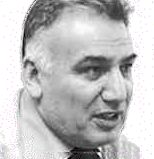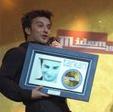Pop Star's Sexuality Sparks Debate
by Nadire MATER | 26.04.01 Bianet News
In its original English (Corrections by Ali Yıldırım)
 "I would have appreciated him more if he were not a homosexual," says ultra-nationalist legislator Mehmet Gül of Turkey's leading pop star, Tarkan.
"I would have appreciated him more if he were not a homosexual," says ultra-nationalist legislator Mehmet Gül of Turkey's leading pop star, Tarkan.
The remark by Gül, of the Nationalist Action Party (MHP), has sparked a heated debate on a series of controversial issues such as sexual preferences, national values and religious beliefs.
Gül might have thought that his remarks would gain him sympathy in a country where traditional values still count. And the confrontation initially seemed normal since Gül is known for his notoriety during the civil strife of the late 1970s when he claimed to be defending conservative values.
Refusing to be bullied, Tarkan hit back at Gül. "I am also a nationalist," he says. "I will settle the matter in court."
A few days after criticising Tarkan, Gül appeared on the Kanal 7 television channel assessing the religious purity and moral integrity of the popular Minister of Economy Kemal Derviş.
"Derviş is a dishonorable man," Gül said, bluntly. "Further, his mother is a non-Muslim, and he is also a Mason."
In just two days Gül, like an elephant in a glasshouse, tore down all his Prime Minister Devlet Bahçeli had done to clean up the image of their party, stained by blood and intolerance in the three decades of violence during 1970-2000.
The public response in favour of Tarkan might provide a hint on how swiftly popular values have changed in Turkey in just a decade.
In 1994 Tarkan's singing career nearly came to an abrupt end after enraging his fans by carelessly uttering the now famous, "Çişim var, ağabey..." ('I've gotta pee, man.') -- before scampering off-camera.
But a year later, in a brilliant public-relations coup, he ditched his pop image and staged a one-man special TV show in which he only sang revered Turkish classics to widespread public acclaim.
His public relations exercise was interrupted a couple of years later when Tarkan angered Turkish conservatives again, this time by refusing to serve the compulsory 18-month military service due to contractual obligations abroad.
 He had found a new audience and was performing in Europe, to wildly adoring fans there. His Euro-fans say his music is the perfect mixture of Western originality and Turkish romanticism. And they just love his "great, sexy voice, and fantastic dancing." Plus, say fans of both sexes, he is "soooo good-looking."
He had found a new audience and was performing in Europe, to wildly adoring fans there. His Euro-fans say his music is the perfect mixture of Western originality and Turkish romanticism. And they just love his "great, sexy voice, and fantastic dancing." Plus, say fans of both sexes, he is "soooo good-looking."
He even received a prestigious 'Cannes Music Award' for his blockbuster hit "Şımarık" ('Spoilt').
Tarkan was born in Germany in 1972 and lived there until his father decided to move back to Turkey 1986 when Tarkan was 13.
By 1995 Tarkan - who never used his surname publicly - was already a star both at home and overseas. His second album Acayipsin ('You're Something Else') sold more than two million copies in Turkey and 700,000 copies in Europe - a first-time-ever feat for a Turkish performer.
In 1997, after a three-year break, Tarkan released his third Turkish-language album - and on the tour that followed, he filled the Hippodrome in London, the Bataclan in Paris, and the Arena in Berlin. When the album's single was released, it reached No. 3 in France-and No.1 in Belgium.
Turkish public and the media aspiring for international celebrity at the threshold of European Union have sided with the internationally reputed pop-singer and turned their backs on the ultra-nationalist Gül.
"Who is that Gül, what has he done for this country. But Tarkan is a celebrity who represents Turks in a positive way everywhere in the world. We are proud of Tarkan and Galatasaray football-team," says Ali Coşkun, a waiter in an Istanbul restaurant. "I do not care if he is a homosexual or not."
Ironically, in the past five decades among Turkey's most popular singers homosexuals and transvestites have played a prominent part. Turkey mourned for a week for Zeki Müren, a classical Turkish music singer, who had never openly expressed his homosexual preferences, when he died in 1998. Bülent Ersoy, the doyen of the classical singers today, had started her singing career as a male before undergoing operation to change her sex to a female in 1980 and banned from singing for a while by the military rulers of the 1980s.
To tone down public anger, MHP leader Devlet Bahçeli reportedly advised Gül to join a parliamentary group now visiting the Australian city of Melbourne to distance himself from public exposure.
Tarkan's mother Neşe Tevetoğlu has denied claims that her son is homosexual. "Tarkan is a pure boy. Why are they disgracing my son?" Tevetoğlu said, urging "Gül to apologise."
 On his part, Tarkan has neither accepted nor denied the claims, but adopted a more universal stand that "sexual preferences are not a matter of public debate". Tarkan's stand has gained him support from among Turkish intellectuals who generally believe pop-music is not a matter of art, but entertainment.
On his part, Tarkan has neither accepted nor denied the claims, but adopted a more universal stand that "sexual preferences are not a matter of public debate". Tarkan's stand has gained him support from among Turkish intellectuals who generally believe pop-music is not a matter of art, but entertainment.
"I would be more than happy to be ruled by those deemed by Gül and his fellow nationalists as dishonorable, non-Muslim and mason," says Mine Kırıkkanat, female columnist for the Radikal daily newspaper in Istanbul (pictured left).
"If Mehmet Gül is a heterosexual I wish and I pray Tarkan is a homosexual."
This work is protected by a Creative Commons License and Copyscape. Sharing vs Stealing. Know the difference.
![]()





